In downtown Fort Worth on a Friday night, diners and clubgoers and Bass Hall patrons are likely to see some rather odd athletes bouncing around. What makes them odd is that they are bouncing around on one wheel.
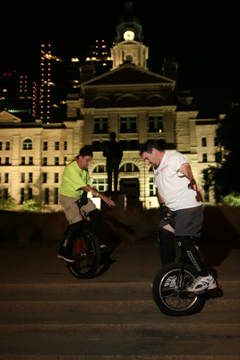 They call themselves Unipsychos, a club of about 30 cyclists who bob and weave and balance on that single wheel. But the uni-jocks take it a little further. They do what one might call extreme unicycling, going down staircases and up curbs, sort of flying around like the skateboarder dudes. They make heads turn, to put it mildly. “We like riding right next to the windows of the restaurants, and it’s real funny when they look up from their meals and see a bunch of unicyclists riding by,” said Brad Johnson, founder and president of Unipsychos. “And out on the street, we get comments from everyone.” Not original comments, of course. It’s “always the same. ‘What happened to your other wheel?’ I tell them it is in the closet.” “But our favorite place is this big piece of granite in front of the police station [near city hall],” Johnson said. “The police love to watch us hopping on and off of that rock. Everyone who sees us do that realizes that it takes a lot of athletic skill to ride one of these.”
They call themselves Unipsychos, a club of about 30 cyclists who bob and weave and balance on that single wheel. But the uni-jocks take it a little further. They do what one might call extreme unicycling, going down staircases and up curbs, sort of flying around like the skateboarder dudes. They make heads turn, to put it mildly. “We like riding right next to the windows of the restaurants, and it’s real funny when they look up from their meals and see a bunch of unicyclists riding by,” said Brad Johnson, founder and president of Unipsychos. “And out on the street, we get comments from everyone.” Not original comments, of course. It’s “always the same. ‘What happened to your other wheel?’ I tell them it is in the closet.” “But our favorite place is this big piece of granite in front of the police station [near city hall],” Johnson said. “The police love to watch us hopping on and off of that rock. Everyone who sees us do that realizes that it takes a lot of athletic skill to ride one of these.”
Over the next few weeks, the world’s eyes will be on athletes in the 30 or so Olympic sports being contested in Beijing – from the major sports like soccer and track and field down to the lesser lights of table tennis and kayaking. Alas, no unicycling. If the prospect of nonstop coverage of all that sweating and hype, not to mention 24-hour sports channels and slurpy coverage of the Dallas Cowboys training camp, is already making you tired, here’s another idea. True to its “alternative” heritage, Fort Worth Weekly went forth to locate other sports enthusiasts in the area who usually get little attention from fans or news media. We found athletes who play golf with Frisbees, a rugby team that is usually near the top in national rankings, college women who are among the best rifle shots in the land, and those unicyclists who zip around on the stairs and streets of downtown every Friday night. Some of the best foosball players and dart throwers in the country call Fort Worth home. Then there’s the (two-wheeled) cyclist who rides for more than 600 miles at a time.
These athletes don’t do it for the money, though some earn a little cash. They share a passion for their sports – and in many cases, a desire to continue competing as they get older. Most of us gave up competitive sports after high school, but for some, there’s still that hole in the ego needing to be filled. Maybe it goes back to when you sank your first-ever lay-up in basketball. Or when Dad let go of the back of the bicycle, and freedom loomed in front of you down the road. Whatever their sport or motivation, as far as these undersung athletes are concerned, it beats watching others do it on TV.
It’s a One-Wheel Town
Most folks might figure that just straight-line riding on one wheel looks tough enough. “Street” or “trials” unicycling, which involves hopping down staircases and on and off ramps, probably seems like a job for, well, psychos. Enter the Unipsychos. Johnson said the goal is to “hop from object to object, ride over a course of impediments, and never put your foot down. “We start at the courthouse and move south through downtown,” he said. “People seem sort of surprised to see unicyclists doing stunts. They look out the windows of restaurants and see us bouncing around up curbs or down steps. Some of our members do freestyle moves, which can be balancing on the tire with your feet and dancing around like break dancing. It’s the hardest to master.”
Johnson got started riding as a kid because his brother had a unicycle. He also learned to juggle and entertained at parties in a kind of circus act. But in the late 1990s, the unicycle world started changing. Riders started going off-road on mountain biking trails, hopping down rocky ledges, and trying more stuntwork on city streets. Mountain unicycling, or muni-riding, has become popular out West, especially in California. And in a unicycle race held last fall in Nova Scotia, riders raced for 800 kilometers (about 500 miles) in stages, sort of a one-wheeled Tour de France. Here, the emphasis is more on the urban rides. Johnson, 45, a local graphic artist, said about a dozen Unipsychos, ranging in age from 5 to 50-plus, come downtown every Friday. “We have a very diverse group, musicians and lawyers and doctors and restaurant workers,” he said. How long does it take to learn the one-wheeled ride? Just a few months, for kids, he said. For older riders, it may take a year to become skillful enough to stop falling over. “You need balance and some athletic ability, and you can be creative,” Johnson said. “We like to be unique. That’s why we go downtown. We have sort of become the flavor of downtown Fort Worth.”
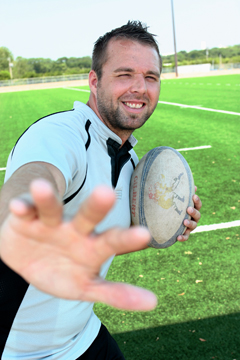 Touch(ing) Down
Touch(ing) DownThere’s an old saying in England that soccer is a gentleman’s game played by ruffians, and rugby is a ruffian’s game played by gentlemen. In America, that truism holds as well. Rugby on this side of the pond is an amateur sport, most of whose players learn the sport in college. It’s particularly appealing to former high school football players who have no chance at making a college team but still are looking for teeth-jarring action. Rugby, in fact, is even rougher than football. Think of scrimmaging without pads. It’s about running with the ball and getting tackled and advancing down the field. Scoring is all about getting the ball over the goal line and “touching it down” in the end zone – but with the major difference that forward passes aren’t allowed.
The Fort Worth Rugby Club, with about 50 members, has been operating since 1971 and has had great success. This year they finished eighth in the country in their smaller-club division. Club president Dan Morgan said players must have a “different mind-set from most recreational athletes. It’s very physically demanding.” Morgan, 35, who works in fund raising in Fort Worth, doesn’t play much these days. Leg injuries from the rugby grind have made it tough. “Can’t play this sport if you can’t run very well,” he said, laughing. Despite the injuries, Morgan stays involved with the club because of the sport’s strong social aspect. The tradition is that the home team hosts the visiting team for dinner and drinks after the match, and the question of who won or lost fades into the background.The Fort Worth Rugby Club is always looking for new members. Non-contact scrimmages are held at Gateway Park in Fort Worth on Tuesday and Thursday nights, for those who “enjoy giving and receiving punishment.” For more information, go to www.fortworthrugby.com.
Sniper Frogs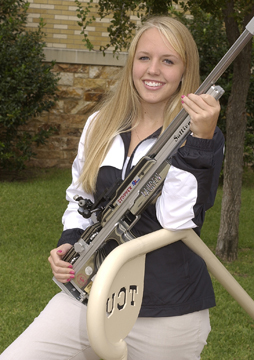
Texas Christian University finished third in this year’s NCAA rifle team competition. But these were not Texas good ol’ boys polishing up their deer-hunting skills. The squad is made up entirely of women. In college rifle-shooting, men and women compete directly, and teams can be of either gender or a mix. TCU’s is one of only two highly ranked teams that are all women.
In TCU’s case, the all-woman team is part of the college’s effort to comply with the federal government’s Title IX policy, which requires equality between genders in spending on things like athletic scholarships. “The only reason the team is all women is simply due to Title IX,” said TCU athletic department spokesman Jack Lawit.
Since the NCAA classifies rifle as a coed sport, that raises a question about whether the school is discriminating against male shooters. “I’m not aware of any males who have expressed interest in joining the team,” said TCU athletic department spokesman Mark Cohen. Simone Riford, 20, a junior from Hawaii, never picked up a gun until she was a sophomore in high school, when a friend talked her into joining the school’s rifle team. “My parents never shot a gun; I never had either,” she said. “But I found out I liked it and got pretty good at it very fast.”
Shooters use two kinds of rifles (small-bore and air rifle) to fire at targets from a distance of about 50 feet. All the members of TCU’s team will be juniors this year (Riford, Erin Lorenzen, Emily Paper, and Lauren Sullivan), so the expectations are high. In last year’s college championships, the TCU women finished just a few points behind second-place Army (all men) and also beat out Navy, which came in seventh. Three team members were named All-Americans. Riford is a studio art major with a 3.8 grade point average. Five of the TCU rifle team members received honors as Mountain West Conference Scholar-Athletes. “One of our professors likes to joke that we won’t get dates if guys see us in our rifle gear,” Riford said with a laugh. “I don’t know about that. Some guys like women who can do things well. And a lot of guys like guns. So we don’t really think about it much.”
Not So Fast There
Randonneur is a French term that loosely translates as someone who “rambles” or goes on a long journey. For more than 100 years, this French term has been applied to cyclists. And how long is a long journey? Oh, 1,000 kilometers – about 621 miles. But randonneuring takes a rather odd approach to the usual rules of athletic competition. The fastest time is not important; in fact, no one is declared a winner in any of the events. If a bike breaks down on the road, the other cyclists stop and help fix it. The cyclists basically compete against themselves, trying to finish as many long-distance events as possible in a calendar year.
And speed, in some ways, is actually discouraged. Riders carry cards that are stamped at various checkpoints along the course. But there are controls on how fast the competitors may go – most keep their speed at 12 to 20 mph. The idea is to prevent cheating in very remote areas (like getting in the back of a pickup truck), but also to allow the riders to go fast and then to use that added time to pick up drinks at a convenience store or catch a nap. “It is all about completing the distances, and bettering yourself,” said Fort Worth cyclist Gary Gottlieb. “We take care of each other out there, and we challenge ourselves from within, not to beat someone else.
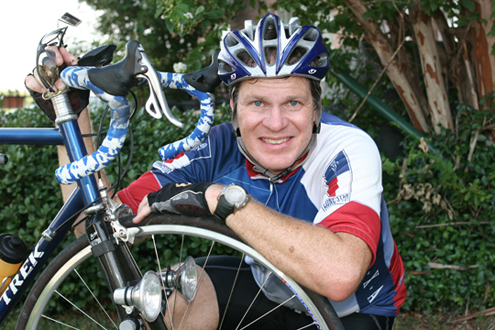 Gottlieb, 44, a Lockheed Martin engineer, has been riding his touring bike in long-distance randonneuring events for about five years now. As he puts it, age is a factor – but maybe not in the way you think. “As you get older in cycling, the endurance goes up, but the speed goes down,” he said with a laugh. “When I was 30 years old, 100 miles was a big deal. Now it is a short ride.”
Gottlieb, 44, a Lockheed Martin engineer, has been riding his touring bike in long-distance randonneuring events for about five years now. As he puts it, age is a factor – but maybe not in the way you think. “As you get older in cycling, the endurance goes up, but the speed goes down,” he said with a laugh. “When I was 30 years old, 100 miles was a big deal. Now it is a short ride.”
The courses, he said, “are usually out in the middle of nowhere Texas. … There is one motel out near Mineral Wells that is near the [checkpoint], and if you get there quickly, you can shower, get a fresh pair of shorts, eat a bowl of spaghetti, and maybe nap for an hour. But I’ve been on some courses where the wind or the weather makes it tough to even make it to the [checkpoint] on time. Then there is no rest.”
Randonneurs ride in 200-, 300-, 400-, and 600-kilometer events, and finishing all of those qualifies as a completed “series.” The 1,000- and 1,200-kilometer events are added accomplishments. Gottlieb expects to complete six or seven series this year. What makes him want to spend his weekends riding 12,000 miles a year? After all, randonneuring has very strict rules: no support teams to hand out water or food, no outside help if the bike breaks down (except from other competitors), everything handled by the bikers themselves. Plus, a 1000-kilometer event takes two and a half days and produces no winners or losers in conventional terms.”Yeah, we are sort of crazy,” Gottlieb said. For more information on randonneuring in North Texas, go to www.lonestarrandon.com.
Throw for Show, Flip for Dough
Disc golf has been around since the 1960s, but it has gained popularity in recent years, as more and more players have found it to be a great alternative to regular golf’s expensive club memberships, greens fees, and ever-more-costly equipment. This form of golf is played with a Frisbee, but the goals are similar: Get your disc into the hole in as few shots as possible.
There is a lot of strategy involved – no, really. Players learn to throw with a fade or a hook to move the disc around trees. Long throws off the tee are good, but accuracy is better. And the short “putts” have to hit that basket and not go past.
Michael Brownlow, 31, a Fort Worth telecommunications engineer, plays the game professionally – kind of. It’s not as if he could make a living at it, since purses at most events barely cover travel expenses. He’s president of the Funkytown Flyers local disc golf club, which has about 50 active members. There are 36 disc courses in North Texas; two local favorites are at Fort Worth’s Z Boaz Park and Veterans Park in Arlington. Holes are measured in feet rather than yards (300 feet for par 3, 600 feet for par 5). “What makes this fun is that there is some athleticism … because the better you can throw, the better you play,” Brownlow said. “But anyone can do it. It is low-cost, and there are no barriers based on age. For some people it is hugely competitive. For others it is a great way to get in a few miles walking in a park.” Five members of the local club have qualified for the national championship tournament, and the Flyers are lobbying for a disc golf course to be included in the renovation of Gateway Park as part of the Trinity River Vision plan. For more information on disc golf, go to www.funkytownflyers.org.
Spinning Class
Folks in their late 40s and early 50s remember hanging out in bars with the disco music blasting and spinning those little plastic soccer guys on the pole. In the late 1970s, foosball was the most popular sports in American bars. The game is still played mostly as an accompaniment to drinking, but a number of tournaments are popping up around the country as well, including one held each year in Fort Worth at JJ Dakota’s bar. Total prize money is $2,000 at the Fort Worth Open Foosball Championship. Chris Hagerman, 28, an estimator for an Azle construction company, plays in about 10 tournaments a year and makes enough money to offset travel expenses. He started playing in 2001, when his dad, one of those 1970s guys, bought a table.
“It collected dust for a while, but then me and my friends discovered how much fun and how much skill it took to be good,” Hagerman said. “There is a strategy and levels of control and mind games that come into play.”
Hagerman is now ranked 106th in the world in singles by the International Table Soccer Federation, and 98th in doubles – pretty impressive, considering the ITSF ranks more than 7,500 players around the world. “I played baseball in college at Texas A&M-Corpus Christi, but after I was done with school, I still had that competitive edge,” Hagerman said. “Foosball fills that spot now. There is some tournament about every night of the week in the Metroplex. You can play against fairly good competition whenever you want.” He prefers doubles because “the complexity of having a teammate makes the game so much more interesting. You have to be thinking with the other guy, make the right passes, and know when and how he is going to shoot.”
Is foosball really a sport? “I hate when people ask that,” he said. “There is as much physical skill and strategy as in table tennis, and that is an Olympic sport.”
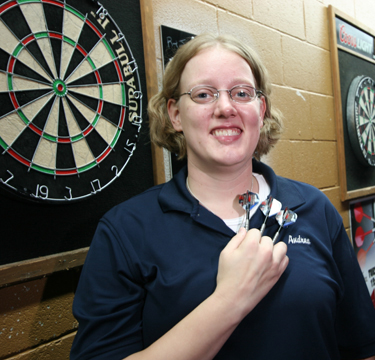 Bulls-Eye
Bulls-Eye
When the American Dart Organization ranks regions in the country with the best dart players, the Fort Worth/Dallas region usually comes out near the top. Arlington’s Davis Snider has been in the top five nationally every year for the last five years, and three of the top-10 women in the country also live in the Metroplex. Andrea Taylor, 27, an English major at Texas Wesleyan University, will travel to Connecticut, Nashville, Atlanta, and Corpus Christi during the next few months to play in national tournaments. Her mother, also a dart player, took Andrea to a bar when her daughter was 12 because the babysitter cancelled. “I came to really enjoy playing, and I’m not sure why,” Taylor said. “People don’t realize the mental aspect of this sport. When you have to hit a double 20 or a bulls-eye to end the game and know your opponent can hit their spots – that puts a lot of pressure on you.”
Darts involves two major games. Best known to amateurs and nonplayers is cricket, in which players try to get three scores in the 20- to 15-point sections of the board. Taylor’s preferred game, however, is 501. In that game, each player has to hit a double (the outer ring) and then fires as many high scores as possible (each hit is subtracted from 501) to move down to zero. To win, a player must “double out” – hit a double to bring the tally to zero.
Don’t get Taylor started on the “is this a real sport” question. “This is absolutely a sport,” she said. “There are times a little luck is involved, but 99 percent of the time it is just how well you shoot. There is mental pressure to perform. “What we have to do is promote this sport better. Poker is all over the TV, and I wouldn’t say that is a sport. Poker is all about luck. But we play a skill sport, and we hope the country starts to take a little more notice.”











